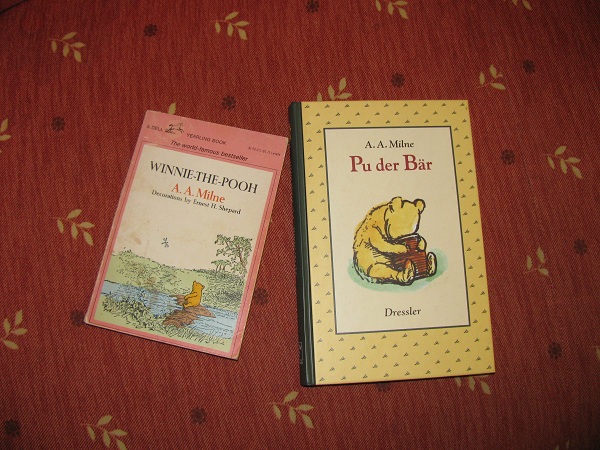It’s time for Sonderling Sunday! That time of the week when I play with language by looking at the German translation of children’s books.
Today I’m back to Pu der Bär, by A. A. Milne, better known to English speakers as Winnie-the-Pooh.
Last time we looked at Pu, we finished Kapitel Drei, so today we’ll look at Chapter Four — “In Which Eeyore Loses a Tail and Pooh Finds One,” which is to say, In welchem I-Ah einen Schwanz verliert und Pu einen findet.
I like lots of parts of the first sentence:
“The Old Grey Donkey, Eeyore” = Der alte graue Esel, I-Ah
“a thistly corner of the forest” = einem distelbewachsenen Winkel des Waldes
(“a thistle-overgrown angle of the forest”)
“his front feet well apart” = die Vorderbeine gespreizt
“his head on one side” = den Kopf auf eine Seite gelegt
“and thought about things” = und dachte über alles nach
“Inasmuch as which?” = Inwiefern? (“To what extent?”)
“came stumping along” = herangestapft kam
“gloomy manner” = düsterer Weise
I’m having fun imagining a reason to say this in Germany:
“Why, what’s happened to your tail?”
= Was ist den mit deinem Schwanz passiert?
“with a long, sad sigh” = mit einem langen, traurigen Seufzer
“solemnly” = feierlich
“So Winnie-the-Pooh went off to find Eeyore’s tail.”
= Also machte Winnie-der-Pu auf den Weg um I-Ahs Schwanz zu finden.
“Little soft clouds played happily in a blue sky”
= Kleine, weiche Wolkenspielten froh an einem blauen Himmel
“skipping from time to time in front of the sun”
= hüpften hin und wieder vor die Sonne
“dowdy” = ungepflegt
“copse and spinney” = Gehölz und Dickicht (“woods and thickets”)
“down open slopes of gorse and heather” = offene Hänge voller Stechginster und Heidekraut hinab
“rocky beds of streams” = felsige Flussbetten
“steep banks of sandstone” = steile Böschungen aus Sandstein
“If anyone knows anything about anything”
= Wenn irgendwer irgendwas über irgendwas weiß
“Chestnuts” = Kastanien
“knocker” = Türklopfer
“bell-pull” = Klingelzug
“notice” = Zettel
“MEASLES” = ZIEGENPETER
“BUTTERED TOAST” = TOASTMITBUTTER
“He’s Moping about it.” = Jetzt bläst er Trübsal.
(“Now blows he sorrow.”)
“very kindly” = überaus freundlicherweise
“Bear of Very Little Brain” = Bär von sehr wenig Verstand
“long words Bother me” = lange Wörter jagen mir Angst ein
“sneezed” = geniest
“a small something” = ein kleines Sowieso
“a lick of honey” = einer Idee Honig (“an idea of honey”)
“frisked” = tobte
“waving his tail so happily” = wedelte so glücklich mit dem Schwanz
And finishing up with the song at the end:
“Who found the Tail?
‘I,’ said Pooh,
‘At a quarter to two
(Only it was quarter to eleven really),
I found the Tail!'”
= Wer fand den Schwanz?
»Ich«, sprach Pu,
»Um Viertel vor ganz
(Das heißt, es war um Viertel vor elf),
Ich fand den Schwanz!«
Bis bald!

I am still astonished by how very Pooh-like Pooh stays in German! Even the poetry here rhymes and feels the same – so very tricky to do in translation!